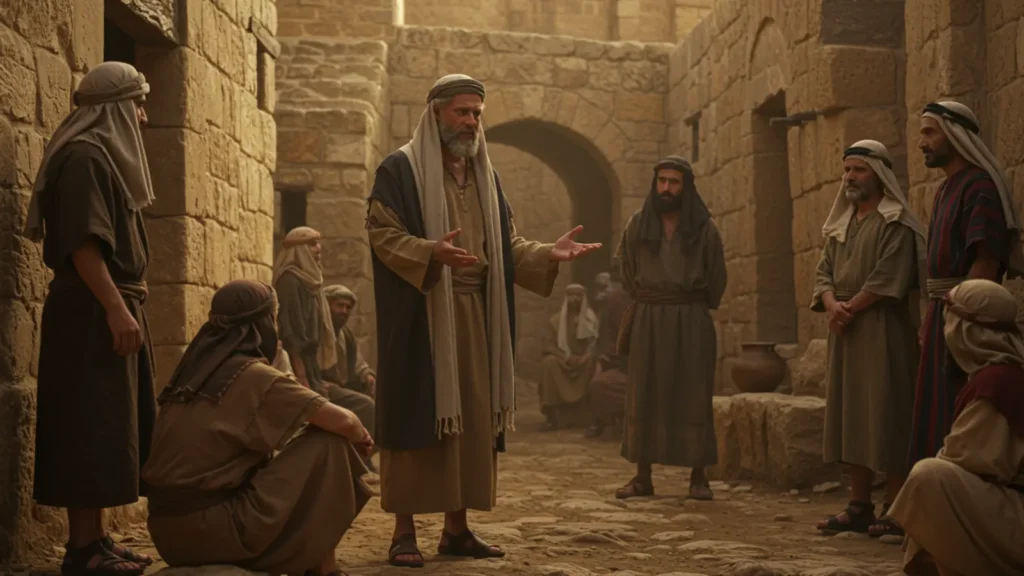Jeremiah 11:11 is one of the most impactful verses in the Old Testament, charged with warning, spiritual weight, and deep symbolism. Throughout history, this text has been remembered as a call to conscience, responsibility, and recognition of the consequences of the choices made by the people of Israel.
In this complete article, we will explore in detail the meaning of Jeremiah 11:11, its historical context, symbolic interpretations, and practical applications for everyday life.
What Does Jeremiah 11:11 Say
The verse states:
“Therefore thus says the Lord: Behold, I will bring upon them a calamity from which they cannot escape; they will cry out to Me, but I will not hear them.”
This passage from the book of Jeremiah presents a direct and firm message from God to a people who persisted in disobedience. The sentence that there would be no escape and that even their cry would be ignored reveals the seriousness of the situation.
Historical Context of Jeremiah 11:11
The Era of the Prophet Jeremiah
The prophet Jeremiah exercised his ministry during one of the most critical moments in Judah’s history. It was a period of political crisis, unstable alliances, and failed attempts to preserve independence in the face of the power of empires such as Babylon.
The Breaking of the Covenant
Chapter 11 as a whole addresses the broken covenant by the people of Israel. They had promised to obey the Lord’s Law, but drifted away, adopting idolatrous practices and social injustices. Verse 11 appears as the inevitable consequence of this rupture.

The Central Message of Jeremiah 11:11
Warning Against Disobedience
The verse highlights that disobedience is not merely a personal choice but an attitude that generates collective and spiritual effects.
The Inevitability of Consequences
Another central point is the notion that certain consequences become unavoidable. A late cry would not be heard because the time for repentance had been ignored.
Divine Silence
God’s silence in this context does not mean the absence of love, but the reaffirmation of justice.
Jeremiah 11:11 and Related Passages
- Deuteronomy 28:15: Presents the curses that would fall upon Israel if they disobeyed the covenant.
- Isaiah 59:2: States that sins create separation between God and man, preventing prayer from being heard.
- Proverbs 1:24–28: Speaks of the moment when the cry will not be answered due to the persistent rejection of wisdom.
- Jeremiah 7:16: God commands Jeremiah not to pray for the people, for He would not listen.
These connections show how Jeremiah 11:11 is embedded in a network of warnings that run throughout Scripture.
Symbolic Reflections on Jeremiah 11:11
The Calamity That Cannot Be Avoided
The “calamity” mentioned in the verse can be understood as the natural consequence of wrong choices—something that takes hold in an unavoidable way.
The Unanswered Cry
This passage symbolizes the importance of the right time to hear and respond to a spiritual call.
Collective Responsibility
Jeremiah speaks not only of individuals but of an entire nation suffering for its choices.

Jeremiah 11:11 Today
A Timeless Warning
Even today, Jeremiah 11:11 is remembered as a warning about the importance of responsibility.
Consequences of Choices
In practical life, this verse points to the idea that every decision bears fruit—positive or negative.
Silence as a Response
Often, silence in the face of certain situations serves as a reminder that there were ignored opportunities for change.
The Cultural Impact of Jeremiah 11:11
Use in Literary Works and Films
This verse has been cited in cultural productions, appearing as a symbol of fatality and inevitability.
References in Sermons and Studies
Preachers and scholars use Jeremiah 11:11 to reinforce messages of vigilance, responsibility, and urgency in hearing the divine voice.
Practical Applications of Jeremiah 11:11
The Value of Obedience
Jeremiah 11:11 reminds us that obedience is not only a duty but also a form of protection. When the people of Israel broke the covenant, they faced inevitable consequences. This shows that following sound principles brings stability and prevents unnecessary pain.
In practice, being obedient means cultivating coherence between what one believes and how one lives. It is to act justly, speak truthfully, and maintain attitudes that reflect faithfulness, even under pressure.
Attentive Listening
Another essential point of the verse is the importance of listening at the right time. The text shows that crying out only after consequences have arrived may not bring immediate change.
Listening attentively means being sensitive to warning signs, guidance, and opportunities to correct course before it is too late. This invites us to practice vigilance, cultivating a posture open to learning and daily transformation.
Collective Responsibility
Jeremiah 11:11 does not speak only to individuals but to an entire nation. The message shows that the choices of many impact everyone’s destiny.
In modern life, this can be applied to different spheres: communities, companies, families, and even entire societies. When there is cooperation for the common good, the fruits benefit the collective. But when the path goes the opposite way, the consequences also affect all.
Assuming collective responsibility means recognizing that every small action contributes to the larger environment. This involves ethical choices, mutual respect, and commitment to whatever generates positive impact.

Frequently Asked Questions About Jeremiah 11:11
What does “calamity from which they cannot escape” mean?
It refers to the inevitable consequences of disobedience, which in the historical case was the Babylonian exile.
Why would God not hear the cry?
Because the people persisted in repeatedly ignoring calls for change until the time for repentance closed.
Is Jeremiah 11:11 still relevant today?
Yes, because the text carries a timeless principle of cause and effect, applicable in different contexts.
Is this verse just a threat?
No, it is a pedagogical warning intended to awaken conscience and promote change.
Is there hope after Jeremiah 11:11?
Yes. Although the text is stern, the Bible itself shows that there is always a path to restoration for those who genuinely seek it.
Conclusion
Jeremiah 11:11 is not only a verse of judgment but also a call to reflection. It shows that choices carry weight, that disobedience brings unavoidable consequences, and that attentive listening is essential. At the same time, it points to the importance of collective responsibility and faithfulness in every aspect of life.
This verse continues to echo through the centuries, inviting each generation to reflect on the value of living with integrity, awareness, and readiness to listen before silence becomes the only response.
READ ALSO:
- Evangelical Birthday Message: Celebrate Life
- Saint John the Baptist: History, Meaning, and Legacy
- Jeremiah 7:13: God’s Voice Ignored and the Lessons for Today
- Luke 10:19: Authority, Protection, and Spiritual Power
- Without Me You Can Do Nothing – Explanation
FOLLOW US ON FACEBOOK